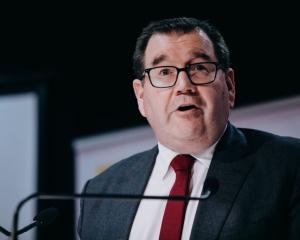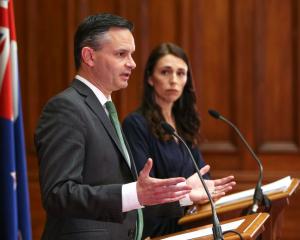
During her visit to Dunedin today, Labour leader Jacinda Ardern announced the party would build on the foundations it put in place during its first term in Government, by preventing installation of new low and medium temperature coal-fired boilers, decarbonising the public transport bus fleet by 2035, and supporting agricultural climate change research programmes.
“I have said that climate change is my generation’s nuclear free moment and the work we have done — and plan to continue — demonstrates Labour’s commitment to that.
‘‘Over the last three years, we have put in place the foundations to reach our 2050 climate obligations.
‘‘The Zero Carbon Act, He Waka Eke Noa — our world-leading agreement with farmers to reduce agricultural emissions — the establishment of the Climate Commission and the Green Investment Fund represent the most concrete actions taken on climate by any Government to date.
‘‘But there is more to do.’’
She said climate change was at the centre of all the party’s policy work and commitments, and it was ‘‘inextricably linked’’ to its decisions on issues like housing, agriculture, waste, energy and transport.
‘‘We firmly believe that to have a real impact on climate change, we must build consensus so the changes stick, and the work must be integral to the range of major policy decisions governments make.
‘‘The next term will be focused on the practical steps New Zealand can take to reduce emissions and keep building on the foundations we have already put in place.’’
To continue the focus on phasing out fossil fuels in process heat, she said Labour would legislate to end the installation of new low and medium temperature coal-fired boilers, and replace them with electric alternatives.
Ms Ardern said transport made up about 20% of New Zealand’s domestic greenhouse gas emissions and was the fastest growing source.
‘‘This needs to change, so Labour will require that only zero emissions buses be purchased by 2025, and will target decarbonising the public transport bus fleet by 2035.
‘‘We will support regional councils with this through a $50 million fund over four years.’’
She said New Zealand’s agriculture sector and farmers had already done a lot to address climate change, and Labour would support them in that work by increasing funding across agricultural climate change research programmes by $6 million a year, to boost research happening in New Zealand, and build on our international leadership in this area.
‘‘This demonstrates our overarching approach to consider climate change in all our work.’’
These initiatives are among other policies for the election, which also reflect Labour’s determination for action on climate change.
They include transitioning to clean energy through 100% renewable electricity by 2030; increasing investment in public transport and incentivising low emission vehicles; supporting farmers to reduce emissions through integrated farm planning; and tackling waste emissions through action on food waste.
Labour’s climate change spokeswoman Megan Woods said as New Zealand recovered from the effects of the Covid-19 pandemic, tackling climate change was an opportunity not just to help save our country and our planet, but also to create jobs.
‘‘Labour’s plan for recovery is about investing for the future, with investments that will deliver huge benefits to local businesses, accelerate the economic recovery, and help our climate.
‘‘Our policies are designed to make the most of that and create a platform for growth in our traditional industries, alongside the creation of new ones.
“We are acutely aware of the effect these changes have on communities and businesses which is why we will continue to ensure just transition as we do this work.
‘‘This extends to our Pacific neighbours who are among those most affected by climate change.”
Comments
‘‘Labour’s plan for recovery is about investing for the future, with investments that will deliver huge benefits to local businesses, accelerate the economic recovery, and help our climate."
It might 'help our climate' but if it does, we will never be able to measure it.
Climate is a global thing and the greatest contributor to CO2 emissions is coal.
The main emitters are China 50.5 %, India 11.3 %, United States 8.5 %, Germany 3.0 % with China and India permitted to keep growing their emissions under the Paris Accord until 2050.
We might live in a Covid bubble but we don't live in a climate bubble.
Unless recovery stimuluses increase productivity and global competitiveness we as a nation will be worse off.
Being nice and feeling good will NOT make a positive difference.
Being nice and feeling good WILL make a positive difference.
Well, yes, but being objectionable and feeling bad is terrible business practice. Masculinist model.
Will being nasty and feeling bad help though?
Last week China committed to reaching peak emissions by 2030 and be Carbon neutral by 2060. As you rightly say the climate crisis is a global issue which is why all nations and indeed all individuals must play their part. This isn't about being nice, this is about investing in the future. If China the world's greatest pollutor realises that it needs to make decisive and radical changes, why can't you?













